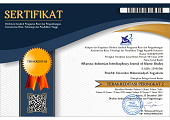Muhammadiyah dan Spirit Islam Berkemajuan dalam Sinaran Etos Alqur’an
DOI:
https://doi.org/10.18196/afkaruna.v13i1.4202Keywords:
Islam Berkemajuan, Civilized Muslim, Transformative social-cultural changeAbstract
Muhammadiyah, one of the largest Islamic movement, has gone beyond a century, and it remains continuously in upholding the ideals of establishing “the truly Islamic society”. What is the Muhammadiyah spirit of sustainability in ad- dressing the challenges of the times? Through library approach, this study finds that the Muhammadiyah movement always loyal to and take inspiration from the three ethos of the Quran in achieving the goal of building a truly Islamic society, those are the ethos of rahmah (compassion), al-Ma’un and al-`Ashr. That ethos has been always established on integrative-interconnective approach between the in- terpretation of the Quran, the sacred heart-mind and the findings of science and technology, and the universal experience of humanity. Rationality is a key of developing the sacred heart-mind capabilities, in addition to experiencing of many nationalities and faiths. From here we know about how to save the lives of people in the world based on the ethos of rahmah. Human happiness is consisting of sincerity, remembering to death, and put science as the key to progress together. Muhammadiyah is also identical with the ethos of al-Ma`un, the religious worth of social praxis. Religiosity tends to reject the formalities of religion for it has been included in the social alignments to advocate the weaks. Al-`Ashr ethos means that religion (iman) and civilization (`amal shalih) are placed as two sepa- rate entities and should be achieved separately. Religion as symbolic formalities is to be important here. Civilization is built through a process of “learning and experiment” and persistency to defeat yourself. Last but not least, Muhammadiyah is no longer overly concerned with the poverty issue, but also regarded to the effective systems and institutions under the effective leadership in building al- hadarah al-fadhilah.
References
Yogyakarta, Suara Muhammadiyah.
Asrofie, M. Yusron. 1983. Kyai Haji Ahmad Dahlan dan Kepemimpinannya,
Yogyakarta: Offset.
Asrofie, M. Yusron. 2005. Kyai Haji Ahmad Dahlan Pemikiran dan Kepemimpinannya,
Yogyakarta: MPKSDI PPM.
Beck, Ulrich. 1992. Risk Society: Toward a New Modernity, London: Sage Publica- tion.
Cooperrider, David. L, Diana Whitney, Jacqueline M. Stavros. 2008. Apprecia- tive Inquiry Handbook for Leaders of Change, Crown Custom Publishing Inc.
Dahlan, Ahmad. 1990. “Kesatuan Hidup Manusia”. Dalam Abdul Munir Mulkhan (peny.), Pemikiran KH Ahmad Dahlan dan Muhammadiyah. Jakarta: Bumi Aksara
Dahlan, KHA. 2002. The Humanity of Human Life dalam Charles Kurzman (ed.), Modernist Islam 1840-1940: A Sourcebook, Oxford and New York: Oxford Uni- versity Press, hlm. 344-348.
Effendi, Lutfi. “ Tafsir Amali dan Gerakan Kesehatan”, http:// suaramuhammadiyah.com/kolom/2016/04/22/tafsir-amali-dan-gerakan- kesehatan/
Al-Faruqi, Isma’il Raji. 1982. Tauhid, Bandung: Penerbit Pustaka. Hadjid, KRH. 2005. Pelajaran KHA Dahlan, Malang: UMM Press.
Hadjid, KRH. 2006. “Muqaddimah”. Dalam Budi Setiawan dan Arief Budiman Ch. [ed.]. Pelajaran KHA Dahlan: 7 Falsafah Ajaran dan 17 Kelompok Ayat Alquran. Yogyakarta: LPI PPM.
Hadjid, KRH. 2013. Pelajaran KHA Dahlan: 7 Falsafah dan 17 Kelompok Ayat Alquran, Yogyakarta: MPI PPM.
Hamka. 1985. Tafsir al-Azhar Juz 28-29-30, Jakarta: Pustaka Panjimas.
Hefner, Robert W., Sukidi Mulyadi, Abdul Munir Mulkhan. 2008. Api pembaharuan Kiai Ahmad Dahlan, Jakarta: Multi Pressindo.
Huntington, Samuel. 1996. The Clash of Civilizations and the Remaking of World Order, New York: Simon and Schuster.
Kutoyo, Sutrisno. 1998. Kyai Haji Ahmad Dahlan dan Persyarikatan Muhammadiyah,
Jakarta: Balai Pustaka.
Mukhan, Abdul Munir. 2015. Boeah Fikiran Kijahi H.A. Dachlan, Jakarta, Global Base Review & STIEAD Press.
Mulkhan, Abdul Munir. 2010. Kiai Ahmad Dahlan, Jejak Pembaruan Sosial dan Kemanusiaan, Jakarta: Kompas.
Mulkhan, Abdul Munir. 1986. Pesan-Pesan Dua Pemimpin Besar Islam Indonesia: Kyai Ahmad Dahlan dan Kyai Hasyim Asy’ari, Yogyakarta: Penerbit Persatuan Yogyakarta.
Mulkhan, Abdul Munir. 1990. Warisan Intelektual K.H. Ahmad Dahlan dan Amal Muhammadiyah, Yogyakarta: PT. Percetakan Persatuan.
Mulkhan, Abdul Munir. 1990. Warisan intelektual KH. Ahmad Dahlan dan amal Muhammadiyah, Yogyakarta: Pustaka Persatuan.
Mulkhan, Abdul Munir. 2000. Menggugat Muhammadiyah, Yogyakarta: Pajar Pustaka Baru.
Mulkhan, Abdul Munir. 2010. Kyai Ahmad Dahlan: Jejak Pembaruan Sosial dan Kemanusiaan, Jakarta: Kompas.
Mulkhan, Abdul Munir.1990. KHA Dahlan dan Muhammadiyah, Yogyakarta: Bumi Aksara.
Mythen, Gabe. 2004. Ulrich Beck A Critical Introduction to the Risk Society, Lon- don: Pluto Press
Permata, Ahmad Norma. 2015. “Teologi Al-‘Ashr dan Visi Peradaban Muhammadiyah”. Dalam Azaki Khoirudin. Teologi Al-‘Ashr: Etos dan Ajaran KHA Dahlan yang Terlupakan, Yogyakarta: Suara Muhammadiyah.
Salam, Junus. 1968. Riwayat Hidup KHA. Dahlan: Amal dan Perjuangannya, Jakarta: Depot Pengadjaran Muhammadijah.
Shihab, Quraish. 2002. Tafsir al-Misbah, Jakarta: Lentera Hati
Soedja’, Kyai. 2009. Islam Berkemajuan: Kisah Perjuangan KH. Ahmad Dahlan dan Muhammadiyah Masa Awal, Jakarta: Al-Wasat.
Wawancara Sukriyanto AR (Rabu, 6 Mei 2015).
Downloads
Published
How to Cite
Issue
Section
License
Afkaruna: Indonesian Interdiciplinary Journal of Islamic Studies is licensed under a Creative Commons Attribution-ShareAlike 4.0 International License.







 Afkaruna View My Stats
Afkaruna View My Stats